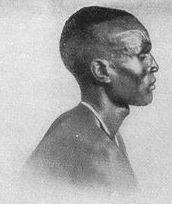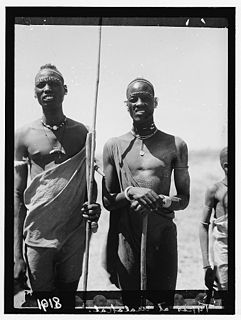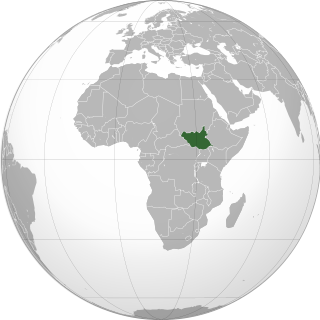Related Research Articles

Khartoum or Khartum is the capital of Sudan. With a population of 5,274,321, its metropolitan area is the largest in Sudan. Khartoum is located at the confluence of the White Nile, flowing north from Lake Victoria, and the Blue Nile, flowing west from Lake Tana in Ethiopia. The location where the two Niles meet is known as al-Mogran or al-Muqran. From there, the Nile continues to flow north towards Egypt and the Mediterranean Sea.

The Sudan, officially the Republic of the Sudan, is a country in Northeast Africa. It is bordered by Egypt to the north, Libya to the northwest, Chad to the west, the Central African Republic to the southwest, South Sudan to the south, Ethiopia to the southeast, Eritrea to the east, and the Red Sea to the northeast. Sudan has a population of 44.91 million people as of 2021 and occupies 1,886,068 square kilometres, making it Africa's third-largest country by area and also the third-largest by area in the Arab league. It was also the largest country by area in Africa and the Arab league by area before the secession of South Sudan in 2011, since which both titles have been held by Algeria.

The demographics of Sudan include the Sudanese people and their characteristics, Sudan, including population density, ethnicity, education level, health, economic status, religious affiliations, and other aspects of the population.
The 2019 transitional constitution of Sudan guarantees freedom of religion and omits reference to sharia as a source of law, unlike the 2005 constitution of Sudan's deposed president Omar al-Bashir whose government had outlawed apostasy and blasphemy against Islam. Bashir's government had also targeted Shia Muslims and those engaging in proselytization to faiths other than Islam. Christians had also faced restrictions in matter of religious freedom.

The Dinka people are a Nilotic ethnic group native to South Sudan with a sizable diaspora population abroad. The Dinka mostly live along the Nile, from Jonglei to Renk, in the region of Bahr el Ghazal, Upper Nile and the Abyei Area of the Ngok Dinka in South Sudan.
The Addis Ababa Agreement, also known as the Addis Ababa Accord, was a set of compromises within a 1972 treaty that ended the First Sudanese Civil War (1955–1972) fighting in Sudan. The Addis Ababa accords were incorporated in the Constitution of Sudan.

Juba is the capital and largest city of South Sudan. The city is situated on the White Nile and also serves as the capital of Central Equatoria State. It is the world's newest capital city, and had a population of 525,953 in 2017. It has an area of 52 km2 (20 sq mi), with the metropolitan area covering 336 km2 (130 sq mi).

The Shilluk are a major Luo Nilotic ethnic group of Southern Sudan, living on both banks of the river Nile, in the vicinity of the city of Malakal. Before the Second Sudanese Civil War the Shilluk also lived in a number of settlements on the northern bank of the Sobat River, close to where the Sobat joins the Nile.

Bor is the capital of Jonglei State in South Sudan. Since 2016, it has also served as the headquarters of Bor Municipality. The city is situated on the east side of the White Nile at the southern extent of the sudd, South Sudan's vast central wetlands.

Malakal is a city in South Sudan and the second largest city after the national capital Juba. And it is the capital of Upper Nile State, South Sudan, near the White Nile River. It also serves as the headquarters of makal county.
The Province of the Episcopal Church of South Sudan, formerly known as Episcopal Church of Sudan, is a province of the Anglican Communion located in South Sudan. The province consists of eight Internal Provinces and 61 dioceses. The current archbishop and primate is the Most Rev'd. Dr. Justin Badi Arama. It received the current naming after the inception of the Province of the Episcopal Church of Sudan, on 30 July 2017.

Christianity has a long history in the region that is now Sudan and South Sudan. Ancient Nubia was reached by Coptic Christianity by the 2nd century. The Coptic Church was later influenced by Greek Christianity, particularly during the Byzantine era. From the 7th century, the Christian Nubian kingdoms were threatened by the Islamic expansion, but the southernmost of these kingdoms, Alodia, survived until 1504.
The Sudanese Reformed Presbyterian Churches (SRPC) are a unified body of Protestant Churches in Sudan.

South Sudan, officially known as the Republic of South Sudan, is a landlocked country in east/central Africa. It is bordered to the east by Ethiopia, to the north by Sudan, to the west by the Central African Republic, to the southwest by Democratic Republic of the Congo, to the south by Uganda and to the southeast by Kenya.

South Sudan is home to around 60 indigenous ethnic groups and 80 linguistic partitions among a 2018 population of around 11 million. Historically, most ethnic groups were lacking in formal Western political institutions, with land held by the community and elders acting as problem solvers and adjudicators. Today, most ethnic groups still embrace a cattle culture in which livestock is the main measure of wealth and used for bride wealth.
There are conflicting reports as to the religious beliefs in South Sudan, though all agree that the three main religions are traditional African religions, Christianity and Islam. The South Sudanese President Kiir, a Roman Catholic, while speaking at Saint Theresa Cathedral in Juba, South Sudan, stated that South Sudan would be a nation which respects freedom of religion. The reported estimated relative proportions of adherents of traditional African religions and Christianity have varied.

Lesbian, gay, bisexual, and transgender (LGBT) persons in South Sudan face legal challenges not experienced by non-LGBT residents. Male same-sex sexual activity is illegal and carries a penalty of up to ten years' imprisonment. LGBT persons are regularly prosecuted by the government and additionally face stigmatisation among the broader population.

The Catholic Church in South Sudan is composed of one ecclesiastical province with one archdiocese and six suffragan dioceses. There have been a total of 31 bishops in South Sudan to date. The bishops of South Sudan and Sudan are currently members of one single bishops' conference, designated as Sudan Catholic Bishops’ Conference.
In Eastern Catholic canon law, a territory dependent on the patriarch is a low-ranking, pre-diocesan type of Eastern Catholic jurisdiction, directly dependent on the patriarch who heads a rite-specific particular church sui iuris, but not part of his or any ecclesiastical province, and in Rome depenent on the Congregation for the Oriental Churches.
The Province of the Episcopal Church of Sudan is a province of the Anglican Communion, comprising the Sudan. It is the 39th Anglican province, created in a ceremony that took place in All Saints Cathedral, Khartoum, on 30 July 2017. The first archbishop and primate is Ezekiel Kondo.